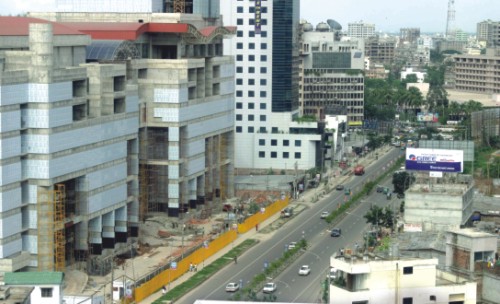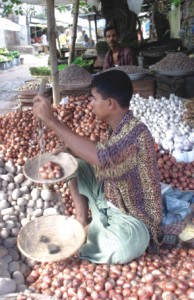| Economy
Life Lost in Living
Spiralling price of essentials means that
the health of the ordinary masses is at risk
Ahmede Hussain

For 55-year-old hawker Ahmad Ali, father of three, life in the last few years has been a miserable journey. The prices of essentials are rising sharply; but his income is proportionately decreasing. “People do not buy old books like the way they used to,” Ali says, as he sits near his makeshift stall in front of the Institute of Fine Arts at Dhaka University. Meat and fish have gradually evaporated from his shopping list as the price of rice has skyrocketed over the last few months. This trend, however disturbing, has repeated itself in the households across the country. In a situation like this, when 'silent hunger' stalks the bazaars, people, especially the poor ones, have to make a choice between going hungry and having food that is low on micronutrients.
“Micronutrient deficiency in a society takes place slowly and silently,” says a professor at Institute of Food and Nutrition at Dhaka University. She says that as prices increase, the poor make a conscious decision and go for food items that are cheap. “And we all know that these things, which do not have the right micronutrient may cause a whole lot of diseases,” she continues, “We call this micronutrient disorder. It gives birth to diseases as ghastly as night blindness, which happens because of improper Vitamin A intake; Iodine deficiency disorder and anaemia--diseases that cripple the human body and are capable of killing the productivity of an entire nation.”
What is particularly telling is that this silent hunger remains unnoticed till a large number of people fall victim to it, drastically decreasing the growth of an entire economy. “Contrary to famine or famine-like situations, there is no drama involved in it. People do not die en mass, the rich and the mighty hardly notice it until an entire generation is wiped off,” she says. She believes the root causes must be addressed; “Here,” she says “we are talking about things as basic as providing the masses with cheap cereal and non-cereal food items.”

As prices soar, many more children will go hungry.
For that to happen prices have to dramatically go down, which, as the Ramadan has come, seems to be a remote possibility. “The situation is strange,” says economist MM Akash, “because even though wholesale prices of the essentials are decreasing on both local and international markets or have remained constant, prices have been spiralling out of the reach of the ordinary people at the retail market.” This means that a nasty form of speculative trade is at work and the middlemen are reaping extraordinary profit from this unnatural situation.
It also means that some people, a minority of the entire populace though they are, have remained outside this so-called price hike--they can spend hundreds on trivialities such as having burger a at one of the many up scale fast food joints that have mushroomed the claustrophobic landscape of the capital. “This wrong demand effect is coming due to a very high-income inequality,” Akash says, “It's driven by cheap unearned income and black money.” This trend contributes to further price hike, which for its turn gives birth to inflationary pressure.

A nasty speculative trade is at work. |
The supply of the essentials has remained vigorous, there is no scarcity of pangash or beef in the bazaar, some customers are buying beef at 200 tk a kg, or will still buy it if prices increase to 500 Tk a kilo, the silent majority of the country are finding it difficult to find their day's meal.
The solution, Akash thinks lies in the creation of an alternative supply channel. He says, “You can never expect private profiteers to run their businesses on an ethical basis.” The alternative supply channel, he says, can take the form of rationing; the fledgling Trading Corporation of Bangladesh, which has been rendered ineffective by flawed policies of the subsequent governments, can be reinvigorated. The government can set up small stores and Operation Dhalbhat of the Bangladesh Rifles has to be extended to the remote areas of the country.
Ahmad Ali, meanwhile, slaves away another day. He has earned around 200 Taka today, he needs to pay a toll of Tk 20 to the police and 10 more to the 'owner of the footpath', still it is enough to buy home a kilo rice and some kachki fish. “My wife cooks kachki fish well with potato,” he says, “it tastes superb if in the curry the potato is one third of the fish. But with what I have earned today I won't be able to buy more that 250 gram of kachki.” A hard choice here, too.
Copyright (R) thedailystar.net 2008 |
